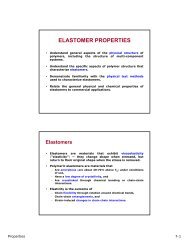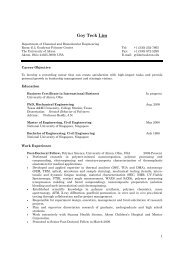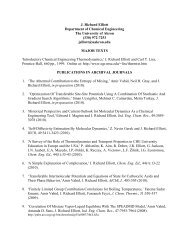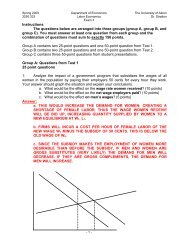Sociology of the Anarchists - Gozips.uakron.edu - The University of ...
Sociology of the Anarchists - Gozips.uakron.edu - The University of ...
Sociology of the Anarchists - Gozips.uakron.edu - The University of ...
You also want an ePaper? Increase the reach of your titles
YUMPU automatically turns print PDFs into web optimized ePapers that Google loves.
<strong>the</strong>y could get it for free? Of course, if everyone thought and acted so, <strong>the</strong> public good<br />
would not be paid for (and not just talking in economic terms), and no one would be able<br />
to enjoy it. Thus, how do social and political movements start and gain power when<br />
people can enjoy <strong>the</strong> gains <strong>of</strong> <strong>the</strong>se movements without even participating in <strong>the</strong>m? Olson<br />
says that “selective incentives” are what keep people involved: <strong>the</strong> addition and<br />
subtraction <strong>of</strong> public goods. For example, why do people contribute money to public<br />
radio or television, while <strong>the</strong>y could still listen and watch <strong>the</strong>m without contributing? (Put<br />
aside, temporarily, <strong>the</strong> fact that <strong>the</strong>se services are paid for substantially through public tax<br />
dollars already...) Because <strong>the</strong>y are <strong>of</strong>fered incentives for doing so, like t-shirts, CDs,<br />
c<strong>of</strong>fee mugs, and so forth. <strong>The</strong> anarchist reaction to “selective incentives” might be that,<br />
yes, everyone needs to feel that <strong>the</strong>y are personally getting something out <strong>of</strong> contributing<br />
to such things (like NPR or PBS), but that <strong>the</strong>y do not (or ra<strong>the</strong>r should not) need to be<br />
based in <strong>the</strong> form <strong>of</strong> some material commodity.<br />
Olson writes (quoted in Collins, p. 169), “<strong>the</strong> larger <strong>the</strong> group, <strong>the</strong> far<strong>the</strong>r it will fall short<br />
<strong>of</strong> providing an optimal amount <strong>of</strong> a collective good”. <strong>Anarchists</strong>, <strong>of</strong> course, agree and<br />
feel that society itself (not only activist organizations) must be scaled down to a smaller,<br />
personal level. He also refers to a latent group which is a very large organization.<br />
<strong>Anarchists</strong> see latent groups as <strong>the</strong> overly large liberal organizations, such as <strong>the</strong> Sierra<br />
Club, National Organization <strong>of</strong> Women, and such—that have decent values, but are so<br />
top-heavy that individual participation in <strong>the</strong>m is almost meaningless.<br />
<strong>The</strong> anarchist understanding <strong>of</strong> why people contribute to movements, especially things<br />
like <strong>the</strong> anarchist movement is better explained by James Coleman.<br />
Coleman, in explaining his “second order free rider problem”, thought that zeal was a<br />
primary motivator for those who are passionate and willing to pay any cost. This<br />
conception points towards <strong>the</strong> acts <strong>of</strong> suicide bombers, Navy SEALS, and radical<br />
activists. Why would <strong>the</strong>y be willing to pay such high costs for a public good? Including<br />
Navy SEALS in this example along with radical activists shows <strong>the</strong> difference in <strong>the</strong>ir<br />
power position targets: SEALS ei<strong>the</strong>r participate because a) <strong>the</strong>y truly believe that<br />
military violence is necessary to protect American freedom or b) <strong>the</strong>y are mislead in <strong>the</strong><br />
real purpose <strong>the</strong>y play in geopolitics. Thus, are SEALS really expanding <strong>the</strong> public good<br />
by <strong>the</strong>ir actions, or are <strong>the</strong>y involved in war crimes? SEALS are usually involved in<br />
r<strong>edu</strong>cing <strong>the</strong> power <strong>of</strong> <strong>the</strong> already powerless. Activists, on <strong>the</strong> o<strong>the</strong>r hand, also feel <strong>the</strong>y<br />
expand <strong>the</strong> public good, although <strong>the</strong>y usually target <strong>the</strong> powerful (and try to r<strong>edu</strong>ce <strong>the</strong>ir<br />
power). Thus, both SEALS and activists both try to r<strong>edu</strong>ce o<strong>the</strong>rs' power, but in opposite<br />
ways, for divergent reasons.<br />
It is, in essence, altruistic behavior versus free riders, for those who enjoy public goods.<br />
<strong>Anarchists</strong>, <strong>of</strong> course, believe that all have a right to public goods, but that <strong>the</strong>y ought to<br />
be involved in securing and supporting those goods, and that <strong>the</strong> goods should be<br />
rewarded distributed to those who need <strong>the</strong>m most. (??) <strong>The</strong> emergence <strong>of</strong> norms is<br />
where <strong>the</strong> zeal comes from, Coleman says.<br />
Norms are 1) purposefully generated and individuals see <strong>the</strong>mselves as benefiting from<br />
<strong>the</strong> existence and observation <strong>of</strong> <strong>the</strong>m, 2) enforced by sanctions (rewards for obeying,<br />
[ Williams 27 ] [ this is a draft. do not cite. ]






